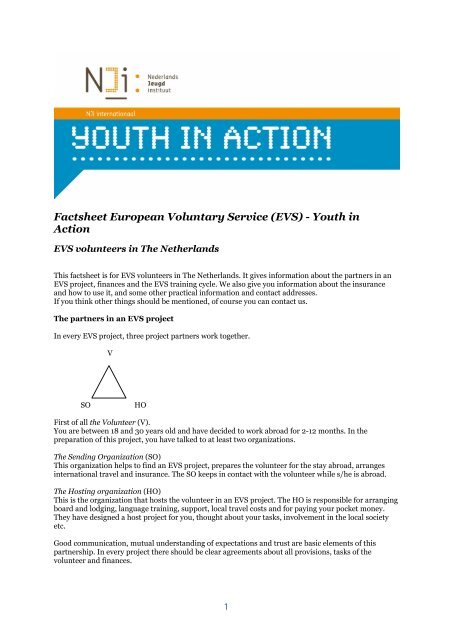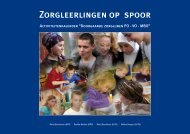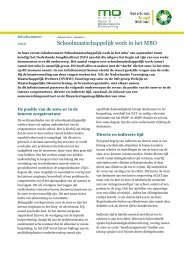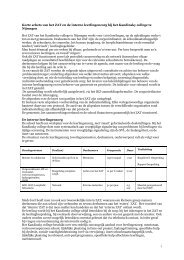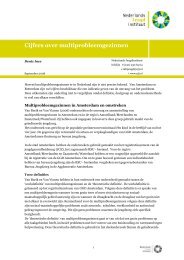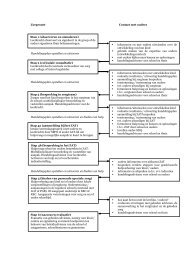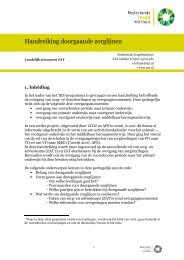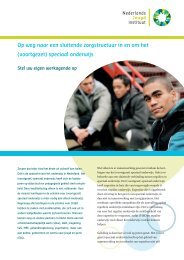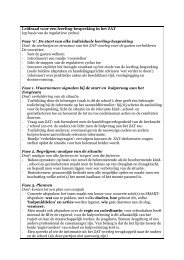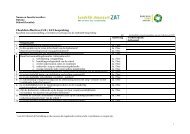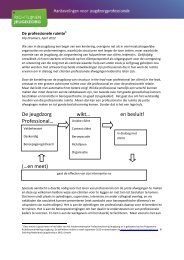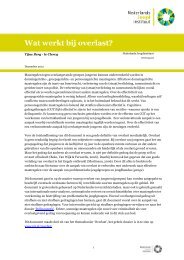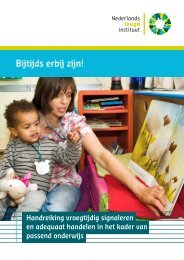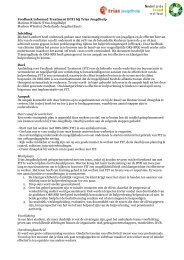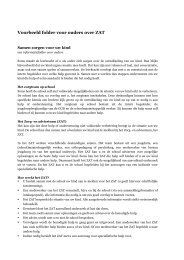Factsheet European Voluntary Service (EVS) - Youth ... - Go Europe!?
Factsheet European Voluntary Service (EVS) - Youth ... - Go Europe!?
Factsheet European Voluntary Service (EVS) - Youth ... - Go Europe!?
Create successful ePaper yourself
Turn your PDF publications into a flip-book with our unique Google optimized e-Paper software.
<strong>Factsheet</strong> <strong><strong>Europe</strong>an</strong> <strong>Voluntary</strong> <strong>Service</strong> (<strong>EVS</strong>) - <strong>Youth</strong> inAction<strong>EVS</strong> volunteers in The NetherlandsThis factsheet is for <strong>EVS</strong> volunteers in The Netherlands. It gives information about the partners in an<strong>EVS</strong> project, finances and the <strong>EVS</strong> training cycle. We also give you information about the insuranceand how to use it, and some other practical information and contact addresses.If you think other things should be mentioned, of course you can contact us.The partners in an <strong>EVS</strong> projectIn every <strong>EVS</strong> project, three project partners work together.VSOHOFirst of all the Volunteer (V).You are between 18 and 30 years old and have decided to work abroad for 2-12 months. In thepreparation of this project, you have talked to at least two organizations.The Sending Organization (SO)This organization helps to find an <strong>EVS</strong> project, prepares the volunteer for the stay abroad, arrangesinternational travel and insurance. The SO keeps in contact with the volunteer while s/he is abroad.The Hosting organization (HO)This is the organization that hosts the volunteer in an <strong>EVS</strong> project. The HO is responsible for arrangingboard and lodging, language training, support, local travel costs and for paying your pocket money.They have designed a host project for you, thought about your tasks, involvement in the local societyetc.<strong>Go</strong>od communication, mutual understanding of expectations and trust are basic elements of thispartnership. In every project there should be clear agreements about all provisions, tasks of thevolunteer and finances.N
What to do in case of a problem or an emergency?It can happen that during your project a problem or emergency occurs. Of course, if it is an emergency,first contact the police, fire brigade or doctor, and your insurance company. Make sure that officialsput everything on paper, and keep the receipts for refunding.If there is a problem, of course it depends on what kind of problem or question, whom to talk to. Ingeneral, the way would be: Talk to your supervisor of the HO Inform your contact person of the SO Try to solve the problem between the three project partners If communication between the project partners is not possible and/or in case of an emergency,contact the National Agency (NA) of The Netherlands.Finances and provisionsThe <strong>Youth</strong> in Action programme supports <strong>EVS</strong> projects financially. A general objective is that thevolunteer does not have to contribute financially to an <strong>EVS</strong> project.Organizations receive fixed amounts for <strong>EVS</strong> projects. The provisions offered by the organizationsdiffer from each other, depending on the kind of organization, the city where the organization is, itsactivities etc.One thing that is the same for all <strong>EVS</strong> volunteers in The Netherlands, is that you will receive €115,00 amonth for pocket money. This is not for food, rent or local transport. You can spend it the way youwant.Training in <strong>EVS</strong> projectsTo do an <strong>EVS</strong> project means that you get a lot of new experiences and learn a lot of new things. Youwill learn to live in a new country with another language and culture. Also you will learn to work in anorganization with maybe different kinds of activities than you are used to. Maybe it is your firstexperience to live on your own. You will probably learn a lot about yourself, your personality.To get the best out of your <strong>EVS</strong> project and to make it a real learning experience, a training cycle is partof your <strong>EVS</strong> project. Every volunteer is obliged to attend the following trainings:O
Pre departure trainingin which you are prepared for a stay abroad, maybe learn something about the country that you aregoing to, talk about your motivation and (discover) your expectations.On arrival trainingin which you will meet other <strong>EVS</strong> volunteers who arrive in the same period as you in The Netherlands.The training is about what is volunteering, how do you feel about being in this country, interculturallearning, how to manage conflicts in your work, and what is, and what to expect from, a supervisor.Midterm meetingthat gives you the possibility to see how far you have come so far with achieving your goals. What haveyou done until now and what do you still want to do, what have been the obstacles and what was mucheasier than you thought, do you speak Dutch already.Returnee day (in some countries)Looking back at <strong>EVS</strong> and looking forward, and what are you doing now. Some of you new ideas, e.g. inthe form of a <strong>Youth</strong> Initiative can be worked out.InsuranceAll <strong>EVS</strong> volunteers are insured through the <strong>EVS</strong> central AXA insurance scheme. On the website of AXAyou can check the cover and the regulations. You can download the brochure of AXA for detailedinformation.Tip: if you have doubts concerning costs contact AXA up forehand!You can be insured by AXA in two ways: Complementary coverYou are still insured in your home country by a nationalinsurance scheme, which has provided you with an EHIC (<strong><strong>Europe</strong>an</strong> Health Insurance Card). Full coverYou are fully insured by AXA. You do not have an EHIC.In case you make medical costs or other costs that are insured: If you have the EHIC: send your bill to Agis in Amersfoort, The Netherlands. If your costs arecovered by your EHIC they will refund them. If you do not have the EHIC or the costs are not covered by it: send in the refund form to AXA inFrance.Important!When visiting a doctor or hospital, show your EHIC. If you do not have an EHIC, explain how you areinsured.If the costs are high, make an agreement on the payment and ask if they can send the bill directly toAgis or AXA. In that case you will not have to pre-finance.P
Important to know when living in The NetherlandsID card/passportIn The Netherlands you are obliged to always carry an ID card or passport with you.MoneyYou can open a bank account. Most chance you will have with a local bank of i.e. the Rabobank. Youneed to fill in some papers and you will receive a card with a ‘pin code’. This card can be used to getmoney from your account and to pay with in i.e. shops. It can be used everywhere in The Netherlandsand often even abroad. The card also has a ‘chipknip’: you can load small amounts of money on yourcard for small payments and making phone calls.Public transportAt train stations of the ‘Nederlandse Spoorwegen (NS)’ you can buy a card for 40% discount on traintrips after 9.00 a.m. and during the weekends. This card costs €55,00 a year. Also for busses and tramsthere are possibilities to travel with discount. Ask your host organization for more information.ShopsShops are usually open from Monday to Saturday from 9.00 a.m. until 5.00 or 6.00 p.m. On Mondaysshops often open a couple of hours later. Shops are normally closed on Sundays, but in large cities theyare open at least once a month on Sunday. In some small towns shops and other businesses close forlunch break. In some cities the shops are open Thursdays until 9.00 p.m., in others that is on Friday.Supermarkets usually open earlier and close later than shops and banks etc.Q
Contact addressesAgis ZorgverzekeringenAfdeling BuitenlandPostbus 17253800 BS AmersfoortP: (+31) (0)33 445 6870Website: http://www.agisweb.nl/For EHIC: http://www.ehic.nlAXA Insurance<strong><strong>Europe</strong>an</strong> Benefits Administrators (<strong>EVS</strong> plan)82, Rue Villeneuve92587 Clichy Cedex, FRANCEP: +33 1 44 71 50 29, emergencies +33 1 55 92 26 06F: +33 1 44 71 48 79E-mail: evs@euroben.comWebsite: http://www.europeanbenefits.comEuro


